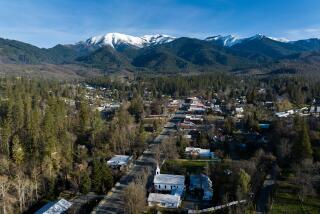Land Seizures Raise Ire in China
- Share via
XISHAN, China — On a recent morning, a dozen construction workers arrived without warning and began to dig up the tea and fruit trees that have provided sustenance for generations of families here.
Mo Jinxiang, 38, ran out to stop them.
“I grabbed two of my tea trees,” said Mo, a short man with skin burnt from years in the sun. “They twisted my arm and loosened my hands, one finger at a time, and they dragged me away.”
The workers also threw two other villagers off their land, including 59-year-old Wang Dongqian, who was hospitalized for a hip injury. Then they cut down hundreds of trees as an earthmover rumbled across some of the richest soil in Xishan, an island town on Lake Taihu, about 75 miles west of Shanghai.
Farmers say local officials seized the land without obtaining necessary approvals and providing adequate compensation. Authorities deny they did anything illegal in transferring the land to an investment company that is developing a software park there, but they refuse to discuss farmers’ complaints.
Land seizures in China have become a common side effect of the nation’s rapid economic growth. Such disputes have led to widespread social unrest -- including bloody clashes -- which is likely to escalate. Last week, a senior Chinese lawmaker said more than 40 million Chinese farmers had had their land partly or wholly dispossessed.
There were 74,000 public protests and riots across the country last year, a sevenfold increase from a decade ago. China watchers said most of these were related to land confiscations and relocations.
Last year, China’s legislature received 5,407 formal complaints involving land seizures, nearly double the previous year.
Chinese Communist Party leaders, who have pledged to create a “harmonious society,” recently approved a five-year economic plan that would try to balance growth by protecting the environment and improving the lives of farmers and the poor.
Local governments have argued that they need to develop land to meet economic goals, create jobs and fund their operations. Beijing has intervened only in the most serious land disputes.
Some analysts have suggested privatizing land as an answer to the upheaval. But there are worries that farmers will sell their plots, and without a means of income, will flood into cities, causing social turmoil.
Privatizing also doesn’t address the problem of corruption, analysts say.
“Many such [land] conflicts involve government officials trading power for money, collusion between businessmen and officials, and regions protecting their interests,” said Gong Piguo, a Beijing attorney who has worked on land-use cases. “So they’re really hard to resolve.”
The central government has struggled to curb corruption, particularly at the local level, and has done little to protect property rights, analysts say.
“The so-called harmonic society must be a society of law. Right now it is not,” said Mao Yushi, head of the Unirule Institute of Economics, a private think tank in Beijing.
Under Chinese law, rural land is collectively owned by the community, with farmers having long-term, renewable land-use leases. But local authorities have routinely taken land from villagers with little or no compensation and have sold it to developers or other parties, often for large profits.
“The problem is local governments today rely on land sales for their primary source of income,” said Minxin Pei, China director at the Carnegie Endowment for International Peace in Washington.
Xishan farmers say township officials announced last year that they would claim about 30 acres, handing out notices to 128 families in two villages. By law, such large land transfers require approval from at the provincial level. Villagers in Xishan, which is in Jiangsu Province, say they’ve repeatedly asked local officials to show them documents authorizing the seizure, to no avail. According to Jiangsu Province guidelines posted on the Internet, farmers whose lands are taken are entitled to at least eight times the value of the crop produced in the last three years. The compensation plan also should be approved by two-thirds of the villagers or their representatives.
Xishan farmers say that never happened. Nor did government officials explain how they calculated payments. But most farmers went along with what local officials told them to do.
For $4,250, Li Faming, 50, signed over his rights to his quarter-acre of farmland. He said he regretted it.
“I was fooled,” Li said.
Li and other farmers estimated their total compensation amounted to about $600,000. They said they might have been shortchanged by $1 million.
Si Kai Investment, which is developing the land, plans to spend about $9 million on the project. Jin Lei, Si Kai’s general manager, declined to comment.
Most Xishan farmers in these two villages still retain some of their land, including homes that they’ve built with their incomes, which was several thousand dollars a year for some families.
Xishan farmers grow red bayberries, plums, peaches, gingko and other fruits and nuts. Their main cash crop is biluochun tea, a rare aromatic light green variety that can fetch as much as $55 a pound in markets. Xishan farmers also sell their goods at roadside stands to tourists who visit Taihu, China’s third-largest lake, and explore the caves and the fruit- and flower-covered hills.
But these days, the peace and stability of their lives have been shattered by the whir of bulldozers and the presence of dozens of workers, including some posted at the construction site to keep farmers away.
Last month, the farmers hired a lawyer and sued the local police for refusing to intervene on Sept. 28 when they were called by villagers. But a court refused to take the case without giving a reason, Wu Zuomin said.
Wu was among 10 people who refused to accept the compensation offered by officials. On a recent afternoon, the 63-year-old sat in the kitchen of his two-story brick house and spread out several books on Chinese laws.
Wu, a stocky man with an easy smile and a sixth-grade education, said he had pored over the law books during the last few years because he knew that many farmers had been beaten off their land.
Wu took out a green folder and carefully opened it, revealing a certificate granting him permission to use 4 acres until 2028, some of which has been taken back.
“How can they claim this land when we haven’t given up our rights?” he asked.
Wu vowed to fight back, saying he planned to take his case to Beijing, if necessary.
“I really support their plan for a harmonious society,” he said. “I hope the local officials will follow that order.”
More to Read
Sign up for Essential California
The most important California stories and recommendations in your inbox every morning.
You may occasionally receive promotional content from the Los Angeles Times.











